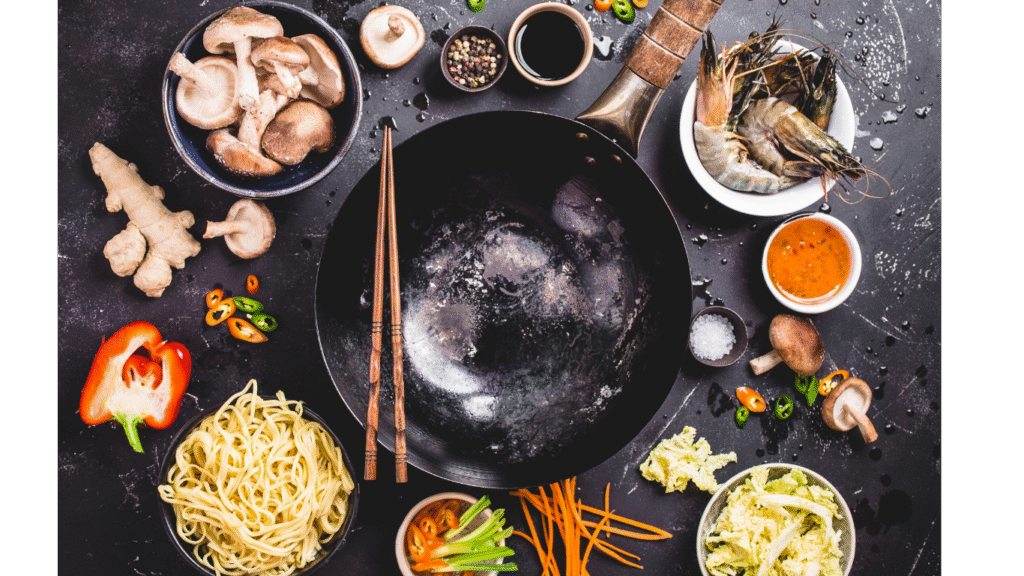Cooking Smells and Fresh Clothes: How to Always Smell Great After the Kitchen

Cooking is a celebration of culture, creativity, and community.
But as many home cooks, especially in Eastern cultures with rich culinary traditions (like Indian, Korean, or Middle Eastern kitchens) know, kitchen smells can linger long.
Sometimes, they even follow you out the door, clinging to your clothes and hair, yikes!
This guide is for you if you love to cook at home but wish to avoid the fragrant reminders.
We’ll explore why cooking smells stick, how clothing choices impact odor absorption, and practical steps to help you always step out feeling fresh and confident.
The Impact of Cooking Smells (and Why Clothes Matter)
If you’re part of a household or culture that loves bold flavors, you know how easily the scent of spices can become a part of your everyday wardrobe.
- Avoid stepping out in cooking clothes. Aromas like fried onions, masala, or fish sauce can linger and become stale-smelling throughout the day.
- Keep a set of “home” clothes for food prep. Change into fresh, weather-appropriate attire before work, school, or social events.
- Air out your clothing for freshness, and use fabric sprays or sachets in your wardrobe.
These simple changes can transform your confidence and show respect for diverse spaces, such as shared work environments or public transportation.
Why Do Cooking Smells Linger on Clothes?
Have you ever noticed how the scent of fried onions, kimchi, or even freshly made curry gets into your hair and on your favorite shirt?
It’s not just your imagination.
The Science Behind Stubborn Odors
Tiny particles (volatile organic compounds, or VOCs) are released into the air when you cook.
Oil droplets, moisture, and smoke carry aromatic compounds that easily settle onto nearby fabrics.
Some of these particles are especially “sticky,” binding to clothing, towels, and furniture fibers.
Certain Foods Are Smellier Than Others

Heavily spiced dishes, anything deep-fried, and ingredients like garlic, onions, fish, or fermented products have strong-smelling molecules that can take hours (or longer) to dissipate.
Fabric Types Matter
Not all clothes absorb odors equally.
Natural fibers like cotton, wool, and linen are breathable but porous, making it easier for them to “hold” smells.
Synthetic fabrics, like polyester and nylon, don’t absorb as much moisture, so smells tend to rest more on the surface.
However, some synthetics (like fleece) cling to odors due to static electricity and their unique weave.
How Your Wardrobe Choices Affect Cooking Odor
Are you wondering why your favorite hoodie smells like something you’ve been cooking? Your outfit does make a difference.
Consider “Cooking Clothes”
Keeping a special apron or a set of “cooking clothes” is an excellent idea.
These should be reserved for time spent in the kitchen and swapped out before heading out or greeting guests.
Choose Fabrics Wisely

- Polyester and blends: Less likely to absorb smells, easy to wash, and often found in athletic or “performance” wear.
- Silk: Luxurious but very porous and delicate, silk can trap strong scents and is harder to clean.
- Cotton: Comfortable and natural, but highly absorbent.
- Denim: Thicker and less porous than most cotton, which can help somewhat block out odors.
- Wool: Warm, cozy, and the perfect magnet for smoky kitchen scents.
Consider wearing an apron or chef coat (available in many stylish options) to protect your outfit, regardless of fabric choice.
Practical Tips to Always Smell Fresh After Cooking
We’ve all been there. Guests arrive early; you dash to greet them and realize the kitchen has left its mark.
Here’s how you can minimize kitchen odors and smell great every time:
Before You Start Cooking
- Change Into Cooking-Only Clothes
- Dedicate a set of casual clothes for the kitchen. After cooking, change into your “public” outfit.
- Tie Back Hair or Wear a Scarf
- Hair is a natural odor-catcher. Scarves, hats, and hair wraps aren’t just cultural statements; they’re practical, too.
- Ventilate the Kitchen
- Open windows, use the exhaust fan or set up a small fan pointing outwards. Good airflow helps whisk away those airborne cooking particles before they settle.
While You Cook
- Wear an Apron or Smock
- Aprons are not just an accessory! They shield your clothes from splashes, spills, and smells. Consider a full-coverage apron or long chef’s coat if you’re an enthusiastic stir-fryer or spice-tosser.
- Keep Lids On
- Cover pots and pans whenever possible. This simple habit traps moisture and odors, reducing what’s released into the air (and onto your clothes).
- Use the Microwave When Possible
- Reheating oily or aromatic foods in a microwave, with the door closed, is a handy way to contain strong smells.
- Light a Candle or Use a Diffuser
- Burning a candle with a neutralizing or fresh scent, such as citrus or lavender, can help mask and reduce lingering cooking odors. Alternatively, using an essential oil diffuser with refreshing scents like eucalyptus or mint can create a welcoming and pleasant environment in your kitchen as you cook.
After Cooking
- Change Out of Your Cooking Attire Promptly
- Place cooking clothes in a separate laundry basket, not back in your closet.
- Quick-Refresh for Hair and Skin
- Wipe your face and neck with a damp washcloth or fragrance-free cleansing wipe. A quick spritz of dry shampoo or a brush-through can help with hair.
- Wash Hands and Wrists
- Smells often linger on exposed skin. Don’t skip this step!
Optional Finishing Touches
- Lightly mist body spray or deodorant, avoiding overuse.
- Choose “clean” essential oil blends like citrus, lemongrass, or mint for a subtle refresh.
Odor-Resistant Fabrics and Smart Laundry Tips
The right fabrics make a noticeable difference, but smart laundering completes the job.
Choose Odor-Resistant Fabrics and Liners
- Performance or activewear brands often offer items treated with odor-resistant coatings.
- Apron liners (often used by restaurant pros) add another layer to trap smells before they reach your clothes.
Laundry Solutions for Stubborn Smells
- Wash cooking clothes promptly, ideally using baking soda or a small scoop of borax in your wash cycle.
- Soak cotton or linens in warm water and white vinegar for an hour before washing for heavy odors.
- Sun-drying clothes, when possible, helps freshen fabrics naturally.
Inclusive Kitchen Communities & Cultural Wisdom
Every culture has its own approach to kitchen smells and clothing.
Some use fragrant herbs around the house; others light incense, hang garlic cloves, or freshen up with rosewater.
Worldwide, cooking traditions are rooted in the community.
Sharing your favorite food and scent-busting hack is as timeless as swapping recipes.
If you have a tip or family tradition, we’d love to hear it!
Drop your methods in the comments and help someone in this community spread great-smelling joy.
Step Into Every Room Smelling Your Best
Cooking is central to countless cultures and family traditions, but kitchen odors don’t need to be part of your signature scent.
With a few conscious choices—from what you wear to how you ventilate, launder, and care for your clothes and body—you can enjoy cooking everything you love while always feeling fresh.
If you have a favorite technique or product for smelling your best, share your story with our inclusive community below.
Together, we can keep home cooking joyful and every first impression crisp.
To stay up-to-date with our blog’s latest articles, tips, and news, consider subscribing to our newsletter!
You’ll receive regular updates delivered straight to your inbox, making it easy to stay in touch with everything related to our content.


